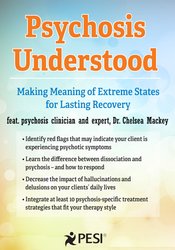

Often misunderstood by both the public and the mental health community, psychosis is far more common than most realize and, more importantly, treatment has come a long way since the days of heavy medication and ECT. In fact, most people who receive adequate treatment go on to live healthy, productive lives with minimal distress.
The key to that treatment success is early intervention. Do you know the signs of psychosis?
Watch Dr. Chelsea Mackey, psychologist and psychosis expert, in this 3-hour recording that takes a deep dive into all things psychosis, from informal identification of psychotic symptoms to the latest evidence-based treatment approaches. In just three hours, you’ll learn how to:
Don’t miss this opportunity to learn how to successfully treat this vulnerable population – buy today!
This online program is worth 3.0 hours CPD.
| File type | File name | Number of pages | |
|---|---|---|---|
| Manual - Psychosis Understood (0.97 MB) | 43 Pages | Available after Purchase | |
| Manual - Psychosis Understood - French (994.7 KB) | 43 Pages | Available after Purchase | |
| Manual - Psychosis Understood - Italian (994.7 KB) | 43 Pages | Available after Purchase |
Chelsea Mackey, Psy.D., has treated individuals experiencing psychosis, voice hearing, spiritual emergencies, and extreme beliefs for the past 14 years in multiple settings. Currently in private practice treating this population exclusively, Dr. Mackey is the former lead psychologist at Kaiser Permanente's outpatient psychiatry department Thought Disorder Program in Northern California. An experienced and sought-after speaker, she is a member of the International Society for Psychological and Social Approaches to Psychosis (ISPS) and has presented at their national conferences in Boston and Portland, as well as their international conferences in Liverpool and Rotterdam.
Dr. Mackey completed her master’s degree in Psychology from the University of Indianapolis, Athens Campus, and her doctorate from Alliant International University in Fresno, CA. Her dissertation was a grounded theory titled: What do African American families need to know in order to make informed treatment decisions about a family member with schizophrenia. She has completed training as a Hearing Voices Network Facilitator and offers a free group in her community, in addition to providing family support groups as part of her treatment approach. Dr. Mackey also provides consultation to therapists about working with extreme states and has been involved in training therapists to work more effectively with clients experiencing psychosis.
More information can be found at her website: www.growingthroughpsychosis.com.
Speaker Disclosures:
Financial: Chelsea Mackey maintains a private practice. She receives a speaking honorarium from PESI, Inc. She has no relevant financial relationships with ineligible organizations.
Non-financial: Chelsea Mackey is a member of the International Society for Psychological and Social Approaches to Psychosis (ISPS).
| 5 |
|
| 4 |
|
| 3 |
|
| 2 |
|
| 1 |
|
Satisfaction Guarantee
Your satisfaction is our goal and our guarantee. Concerns should be addressed to info@pesi.co.uk or call 01235847393.
Please wait ...